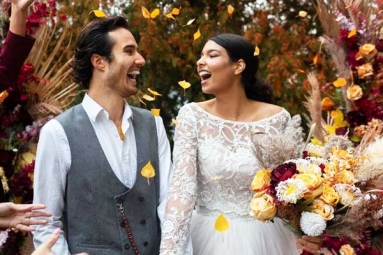
(Image source from: Freepik.com)
Many people think that intimacy means skin or sex, but intimacy doesn't. This is just one way to become intimate with someone. There are many other aspects of intimacy that you have not yet explored. Did you know that there are different types of intimacy in romantic relationships? Learning how to be intimate without sex can help you build a solid foundation of love and respect in your relationship. You don't have to have sex to feel close to your partner. Learn more about non-sexual intimate activities and their benefits. Asexual intimacy is close emotional or physical contact between people that does not involve sexual activity. Couples in particular should work on different types of intimacy to strengthen their relationship. Examples include deep love, trust, open communication, mutual support and shared experiences that shape intimacy and bonding.
It's important to remember that intimacy can exist in all types of relationships, including friendships and family relationships, not just romantic relationships. All of these relationships can function in various intimate ways other than sex. There are also many benefits to couples learning to be intimate without intercourse. It's not necessarily just about sex, but about building a strong love relationship with each other.
Couples counseling also encourages couples to work on ways to be more intimate without sex so they can reap the following benefits:
1. Improve emotional communication
Practicing intimacy without sex can deepen couples' emotional intimacy. This is essential for maintaining a healthy and satisfying relationship.
It's about more than sex, it's about an emotional connection between two people who love and respect each other.
2. Better communication
When couples are intimate without sex, they learn to value the connection.
They learn to talk about their desires, expectations and boundaries, which leads to better communication and understanding.
3. Decompression
By focusing on ways to be intimate without sex, couples can reduce pressure on sexual performance and expectations and reduce stress and anxiety.
4. Increasing intimacy and trust
Participating in non-sexual and intimate activities increases intimacy and trust between couples and is the foundation of a strong and healthy relationship.
5. Increase creativity
By focusing on ideas about intimacy outside of sex, couples can be creative and find new and exciting ways to connect and build bonds, creating more dynamic and fulfilling relationships.
True intimacy with others occurs when we are mindful, relaxed and present in the present moment.
You can be who you are and your partner can be who they are. Communication is established whether we are in the bedroom, at family gatherings or on the phone.
This connection is possible when we embrace and practice the different elements of intimacy.
1. Honor
Take honor as your foundation. It means treating your partner with respect, honor and kindness. Does that sound a little too obvious?
The important point here is that you have to really know your partner to truly respect them.
We decide how to enrich our partner's life based on our (perhaps distorted) perception of who they are or have needed from us in the past. Are your ideas about how to respect your partner outdated?
What do you do when you start dating your partner? What if we chose to listen carefully, ask questions, and seek understanding by listening more?
A quick and important tip – respect yourself too – treat yourself with respect, dignity and kindness. This is not an either/or situation. You can know what your partner wants and what you want.
2. Trust
When we talk about trust in a relationship, we usually mean the trust that the other party will not hurt or upset us. This version of trust is highly conditional. Here from a different perspective -
Trust that your partner knows what is right for you.
It means accepting what is and not what you wish for. Trust goes well with honor. Because by respecting your partner, you get to know them better.
Next time your partner makes a decision that you don't immediately understand, don't criticize them.
Instead, accept that they know exactly what they are doing. Does it sound difficult? which requires freedom of action. Let's take a look.
3. Allowance
In tolerance, everything happens and everything a person says and chooses is interesting.
If you disagree with someone else's decisions, don't let them hurt or offend you. This is because we move away from thinking, being, acting and thinking about what is right or wrong. In other words, you avoid judgment.
The decision to limit or eliminate judgment is very free.
Life and relationships without judgment are expansive, fulfilling and joyful. This is a large area, so read more here if you're interested.
Remember: Just because you get a scholarship doesn't mean you'll be home. This is not possible when practicing Element 1, “Respect.”
Next time your partner makes a decision you don't understand, confide in them (as in Factor 2) and ask, "Why?" I don't want to judge, but to better understand the other person and that level of intimacy create.
4. Vulnerability
We avoid vulnerability because we fear that removing our barriers will leave us helpless and abandoned. The truth is that a quiet, authentic and vulnerable space is the best place to create intimacy.
When you're vulnerable, you don't pretend to be what your partner wants. Instead, you let them see and accept the real you.
What if your partner could see everything about you, even without makeup, when you're having a busy day or feeling depressed?
And don't expect them to correct you or your feelings. This way you can accept any gift without any expectations.
5. Gratitude
My understanding of gratitude is actually greater than love. Love is based on judgment and is therefore conditional. This is similar to the traditional view of trust.
Check out these......:
I love you because you make me laugh, buy me nice gifts, and share the housework and child care with me.
And compare with this:
We appreciate your sense of humor, your ability to choose the right gifts, and your contribution to the running of our home and family.
Adding gratitude makes your words more beautiful. The focus and energy completely change. It will be more open and have fewer restrictions and requirements.
What if you wrote and shared a list of the things you are grateful for in your partner?
Why not make a list of things about yourself that you are grateful for?







